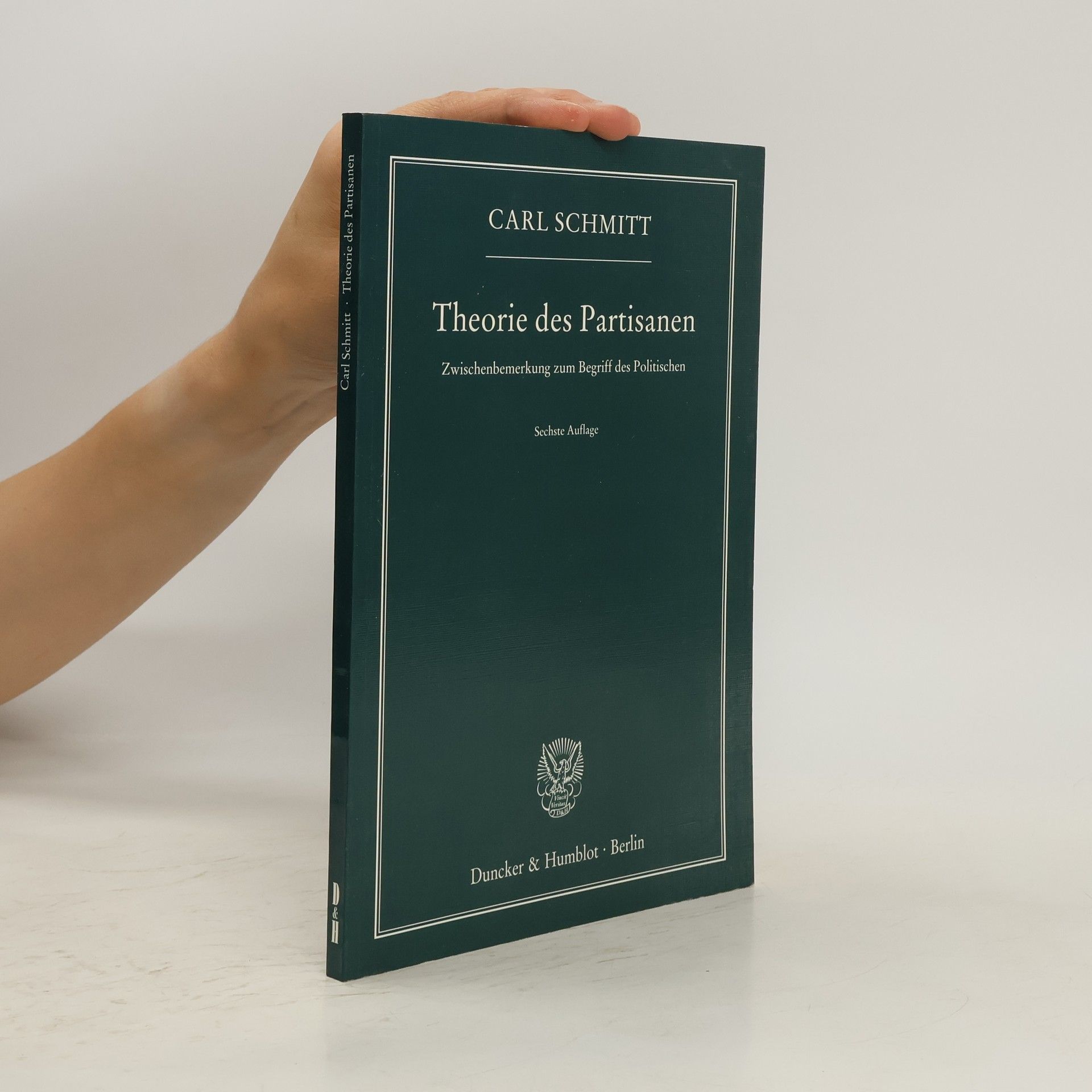Dílo z roku 1923 představuje ranou práci významného právního a politického filosofa Carla Schmitta. V tomto brilantním textu se autor zaměřuje na specifickou povahu racionality spojené s katolickou církví, kterou kontrastuje s myšlením ekonomicko-technického věku. Význam ratio, jež stojí za autoritou katolické církve, spočívá v jeho schopnosti být jednotou protikladů (complexio oppositorum) a reprezentovat duchovní ideu či osobu. Schmitt také zdůrazňuje důležitou distinkci mezi reprezentací a pouhým zastoupením, čímž přispívá k porozumění klíčovým konceptům politické filosofie. Ekonomické myšlení, postrádající jakoukoli ideu k reprezentování, není schopno politiky v jejím pravém smyslu, což vede k depolitizaci veřejného prostoru. Schmittova kritika ekonomicko-technického myšlení se logicky vymezuje vůči socialismu a kapitalismu, které mají společné myšlenkové základy. Jak sám konstatuje, „Velký podnikatel nemá jiný ideál než Lenin, totiž ‚elektrifikovanou zemi‘.“ Oba se spíše přou o metodu elektrifikace. Jeho polemický tón se nevyhýbá ani anarchismu či tezím Maxe Webera, což podtrhuje aktuálnost jeho myšlenek.
Carl Schmitt Knihy
Carl Schmitt bol nemecký právnik a politický teoretik, ktorého vplyvné práce vznikli počas Weimarskej republiky. Jeho teórie suverenity, krízy parlamentnej demokracie a politiky založenej na rozlíšení priateľ-nepriateľ formovali jeho myslenie. Schmitt sa snažil obhájiť Weimarskú ústavu, ale jeho práce zároveň naznačovali posun k autoritárskejšiemu politickému usporiadaniu. Jeho neskoršie práce sa zamerali na medzinárodné právo a kritizovali liberálny kozmopolitizmus, čo vyústilo do jeho monumentálneho diela o základoch medzinárodného práva.







Glossarium: Záznamy z let 1947 až 1958
- 1004 stránok
- 36 hodin čítania
Záznamy pod souhrnným názvem Glossarium představují pozdního Carla Schmitta, kontroverzního myslitele německého 20. století. Zápisky vznikly v poválečné době, kdy Schmitt bilancuje minulost, vypořádává se se svými resentimenty, vyjadřuje se k současnému dění, ale především rozvíjí staré i nové filozofické, právní a literárněvědné úvahy. Český překlad Glossaria zahrnuje všech pět dílčích knih a je opatřen obsáhlým komentářem.
Politische Theologie
- 72 stránok
- 3 hodiny čítania
»Souverän ist, wer über den Ausnahmezustand entscheidet« ist der erste Satz von Carl Schmitts Schrift »Politische Theologie«. Er wird national und international zitiert, oft ohne Nennung des Urhebers, so dass ein weiteres Diktum Schmitts zutrifft, dass er ›Gemeingut aller Gebildeten‹ geworden ist. Die kleine Schrift über Begriff und Problem der Souveränität, Dezisionismus, Politische Theologie als Soziologie juristischer Begriffe und die der Gegenrevolution wird seit Erscheinen im Jahr 1922 bis heute besprochen, gedeutet und kritisiert. Die 10. Auflage enthält Satzkorrekturen aus Schmitts Handexemplar und ein Personenverzeichnis.
In this, his most influential work, legal theorist and political philosopher Carl Schmitt argues that liberalism’s basis in individual rights cannot provide a reasonable justification for sacrificing oneself for the state—a critique as cogent today as when it first appeared. George Schwab’s introduction to his translation of the 1932 German edition highlights Schmitt’s intellectual journey through the turbulent period of German history leading to the Hitlerian one-party state. In addition to analysis by Leo Strauss and a foreword by Tracy B. Strong placing Schmitt’s work into contemporary context, this expanded edition also includes a translation of Schmitt’s 1929 lecture “The Age of Neutralizations and Depoliticizations,” which the author himself added to the 1932 edition of the book. An essential update on a modern classic, The Concept of the Political, Expanded Edition belongs on the bookshelf of anyone interested in political theory or philosophy.
Theorie des Partisanen
- 96 stránok
- 4 hodiny čítania
»Die Ausgangslage für unsere Überlegungen zum Problem des Partisanen ist der Guerrilla-Krieg, den das spanische Volk in den Jahren 1808 bis 1813 gegen das Heer eines fremden Eroberers geführt hat. In diesem Kriege stieß zum ersten Male Volk (...) mit einer modernen, aus den Erfahrungen der französischen Revolution hervorgegangenen, gut organisierten, regulären Armee zusammen. Dadurch öffneten sich neue Räume des Krieges, entwickelten sich neue Begriffe der Kriegführung und entstand eine neue Lehre von Krieg und Politik. Der Partisan kämpft irregulär. (...) Zu allen Zeiten der Menschheit und ihrer vielen Kriege und Kämpfe hat es Kriegs- und Kampfregeln gegeben, und infolgedessen auch Übertretung und Mißachtung der Regeln. (...) Nur ist dabei zu beachten, daß, für eine Theorie des Partisanen im ganzen, die Kraft und Bedeutung seiner Irregularität von der Kraft und Bedeutung des von ihm in Frage gestellten Regulären bestimmt wird. (...)« Aus der Einleitung
Ex captivitate salus
- 120 stránok
- 5 hodin čítania
When Germany was defeated in 1945, both the Russians and the Americans undertook mass internments in the territories they occupied. The Americans called their approach 'automatic arrest'.
The tyranny of values and other texts
- 230 stránok
- 9 hodin čítania
Written during the Weimar Republic, the Nazi era, and the Cold War, this collection of occasional pieces provides an instructive look at the ways in which Carl Schmitt employed his theories in order to make judgments about contemporary historical events and problems. Covering topics such as the political significance of universalism and jurisprudence, the meaning of the partisan, the world-historical significance of the Cold War, the deterioration of metaphysics into "values," the relationship between theoretical concepts and concrete historical situations, and his views on thinkers such as Machiavelli, Bodin, and Rousseau, these essays establish a revealing counterpoint to his more formal work. They react on the one hand directly to contemporary political questions and demonstrate the way in which he saw the immediate historical significance of his ideas. On the other hand, he also feels free to provide in these pieces the kinds of methodological reflections that help us to better understand the particular epistemological framework that makes his thought so unique.
Constitutional Theory
- 560 stránok
- 20 hodin čítania
Provides an interpretation of the Weimar Constitution. This book presents an argument that the legitimacy of a constitution depends on a sovereign decision of people. It develops an understanding of liberal constitutionalism that makes room for a strong, independent state. It includes an introduction by Jeffrey Seitzer and Christopher Thornhill.
Dictatorship
- 288 stránok
- 11 hodin čítania
Carl Schmitt is widely recognized as one of the most important political theorists of the 20th century. This is the only remaining work by Carl Schmitt which has not yet been translated into English.
On the three types of juristic thought
- 136 stránok
- 5 hodin čítania
The only English-language translation of one of Schmitt's most controversial works.